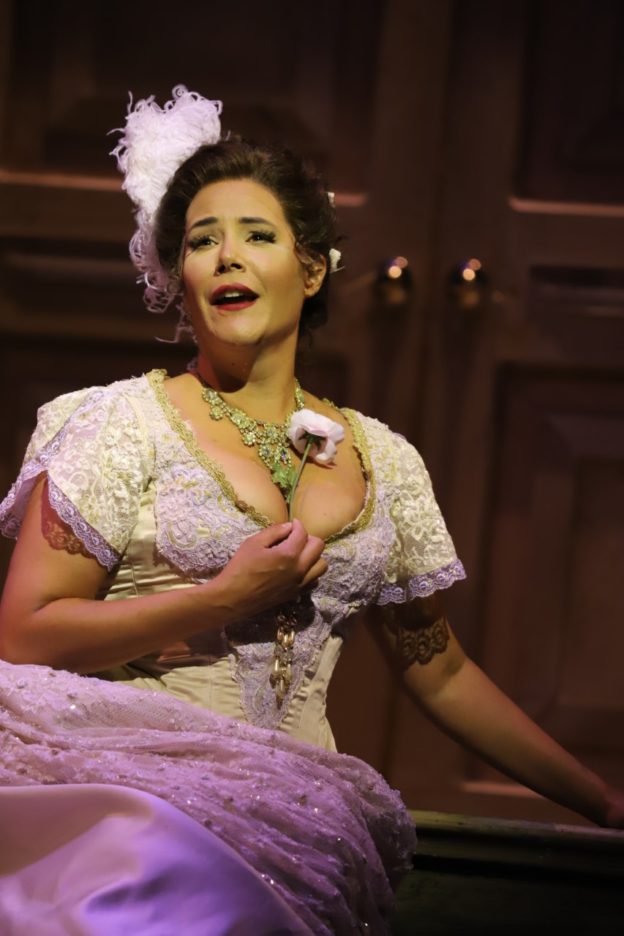
Star-Advertiser – Trifecta of stars highlight Hawaii Opera Theatre’s ‘La Traviata’
By Steven Mark
Opera lovers in Hawaii win the trifecta with Hawaii Opera Theatre’s presentation of Verdi’s “La Traviata,” which debuts Friday at Blaisdell Concert Hall. The lavish production stars enticing, exciting performers in the three major roles.
Playing “the fallen woman” Violetta will be soprano Danielle Talamantes, one of the most acclaimed and versatile young singers of the day. Island favorite Pene Pati, the Samoan-born tenor of the New Zealand trio Sol3Mio, whose tenor voice critics recently described as “an absolute revelation,” plays Alfredo, the “young romantic” who loves Violetta.
Finally, “the villain” will be played by none other than Hawaii’s own Quinn Kelsey, now a global superstar entering his prime as the “Verdi baritone” of this generation. He plays Alfredo’s father, Germont, who wants Violetta to break it off with his son.
If you’re not an opera lover — yet — “La Traviata” is worth a look and a listen. It’s a classic story; you probably already know it already, since it partially inspired the Julia Roberts/Richard Gere film “Pretty Woman.”
Its theme of the fallen women — “La Traviata” literally means “the woman led astray” — who finds nobility in true love has resonated in modern times, forcing the tradition-bound opera world to reassess such characters, said guest director Stephanie Havey.
“There’s a lot of discussion today in the opera world around how we portray these female characters,” Havey said. “How much do we want to portray them as victims, who are suffering and dying, and we’re watching the spectacle of that — but is there more to the story to tell?
“I think there absolutely is, especially with Violetta. She is a very strong character, who is fighting for her life, and also for a belief that she has in love, a redemptive love that can save her, even though she may be a fallen woman.”
Havey has spiced up the period production with some dances set to the various musical interludes in Verdi’s music. She added them after noticing that both the opera and the novel that inspired it, Alexander Dumas’ “The Lady of the Camellias,” contained references to the Carnival Season, with one scene featuring a matador and a gypsy.
“They represent death and love, which in fact was Verdi’s original title of the opera,” Havey said. “The censors made him change it to ‘La Traviata,’ but I think that death and love are these themes that he wanted to bring across. … I felt this was a metaphor for Violetta’s life.”
TALAMANTES HAS played Violetta four times and has a special affinity for the role, especially in HOT’s traditional presentation of Violetta as a courtesan in Parisian high-society.
“I’m pretty expensive — expensive and exclusive,” Talamantes said with a laugh, describing Violetta. “She wants for absolutely nothing, except maybe a less superficial life. She’s quite resigned to her fate in terms of she’s not going to live a long life, so she might as well enjoy what she’s got.”
Talamentes’ diverse talents have earned rave reviews not only for her opera performances but for her recordings of Duke Ellington tunes and Spanish canciones.
Her abilities will be on full display in Verdi’s magnificent score, which features opera standards like “Sempre Libera” (“Free and aimless”), an aria at the end of the first act.
She especially likes the music of the second act, where she is confronted first by Germont and then by Alfredo, who publicly humiliates her after mistaking her intentions.
“That’s just juicy stuff,” Talamentes said. “It’s just lush and so emotional. She’s on a rollercoaster the whole time.”
Pati has also performed in “La Traviata” four times, deepening his insight into his role as Alfredo. Pati sees Alfredo not as a hopeless romantic, but rather a “confident lover” — one who pursues Violetta not as a conquest, but out of genuine love and affection.
“There’s so many people in the world to chase, but he decides to fall in love with a courtesan, which leads me to believe he distinctly made that decision, that, ‘There’s something about her that draws me, and I’m going after her, even though I know she’s been with so many people,’” he said.
Pati’s career was launched when, almost on a whim, he and his brother Amitai, a fellow tenor, and their cousin, baritone Moses Mackay, started concertizing together to raise funds to study overseas. “Within the space of two weeks, we became, like, national treasures,” he said. “It was insane.”
The opera world is quickly taking notice. The San Francisco Opera took him under its wing in 2017, coaching him for an entire year to perform opposite Kelsey in “Rigoletto.”
“This is just something that doesn’t happen anywhere, that a young artist is given a lead role in a main stage production,” Kelsey said, expressing pride in seeing a fellow Polynesian making it in opera.
FOR HIS part, Kelsey is happy to embrace his role as an ambassador of opera, advising younger singers about the responsibilities of the job such as media demands and meeting with donors, as well as staying fit and prepared to perform.
“On top of that, it’s that I represent the art form, and I represent my culture and my heritage,” he said.
Kelsey’s Hawaiian roots are still an object of fascination in the opera world. When he’s in foreign countries, he has to be sure to pronounce “Hawaii” as “hawaee” rather than “havai-i,” he said, because people don’t recognize the proper pronunciation.
He sees his character Germont as an intelligent man who has acquired wealth and is acting as a father would in trying to protect his family.
“He thinks he’s got (Violetta) all figured out,” Kelsey said. “(He) makes the mistake of thinking, ‘She just wants him for our money’ – dad’s money. … She immediately shoots him down and then he realizes ‘OK, she’s not at all what I thought.’
“And the turning point for him is having the guts to accept that he’s wrong.”
Germont winds up in conflict with his son as well, ultimately regretting his entire role in the situation.
“I feel like he suffers the most out of anybody, because he knows better,” Kelsey said.
Vocally, the role fits comfortably in Kelsey’s voice. He first did it in 2008, and “it’s just gotten better since then,” he said.
Germont is not considered one of the most challenging of the Verdi baritone roles – “Rigoletto” probably occupies that spot – but the audience will still be in for a treat.
That’s the estimation of guest conductor Emily Senturia, who is making her HOT debut and conducting “La Traviata” for the first time.
“The great thing about Quinn’s singing is not just that it’s beautiful – it is beautiful – but he’s so attuned to the text and the drama of what is happening. He really becomes the character,” Senturia said.
As for “La Traviata,” Senturia called it “heartbreaking,” with beautiful music that conveys the sense of drama and characters.
“There’s plenty of opera written around this time where you get stock characters,” she said. “But this feels really specific to the characters. You get a really good feeling of who these people are.”
This article originally appeared in The Honolulu Star-Advertiser on May 16, 2019.
